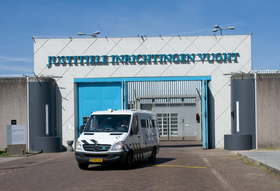Little empirical evidence for recruitment in prisons

European countries are taking drastic measures to prevent the risk of radicalisation among prisoners, although there is little empirical evidence that such a risk actually exists. Rather, correctional policies should focus on rehabilitation and reintegration of extremist offenders, according to a study of the Tinka Veldhuis. On 26 March she will defend her dissertation at the University of Groningen.
The risk of prisoner radicalisation receives widespread public and political attention in Europe. Several perpetrators of violent extremist attacks, including one of the Kouachi brothers responsible for the violent assault on satirical magazine Charlie Hebdo in Paris, appear to have radicalised in prison. In response, several countries are considering drastic measures to prevent extremist offenders from radicalising and recruiting fellow inmates, for instance by segregating extremists in separate high-security prisons.
Counterproductive
However, research in the Netherlands shows that such policies may produce undesired outcomes and may even prove counterproductive in the longer run. “Housing extremist prisoners together in restrictive security regimes may fuel frustration and anger among the inmates and their communities. It can also lead to stigmatisation and contribute to post-release reintegration problems and radicalisation”, says Tinka Veldhuis, author of the study. “It seems that public fears of prisoner radicalisation give rise to policy responses which focus only on short term outcomes but ignore potential undesired side-effects.”
Inmate hierarchy
In fact, the risk of prisoner radicalisation may be lower than is often assumed. “Terrorism offenders appear to dangle at the bottom of the inmate hierarchy, at least in the Netherlands”, according to Veldhuis. “Our findings suggest that extremists cannot easily gain an influential position in prison. Of course there may be certain charismatic figures who can have a radicalising influence on other prisoners, but this is certainly not true for all extremists. Categorically segregating all extremist offenders from the mainstream inmate population does not seem a necessary response. Some may even adopt more moderate views if they are exposed to non-extremist prisoners.”
Reintegration
Rather, terrorism detention policy should focus on reintegrating extremists back into society, suggests Veldhuis. “If the risk of radicalisation among other inmates is indeed smaller than is often assumed, then placing extremists in harsh regimes that only radicalise them further is not helpful. Most of these inmates will eventually be released into society. From a security perspective, it is important to invest in rehabilitation, so that they can reintegrate into society and steer away from extremist views.”
Read the dissertation.
CV
Tinka M. Veldhuis is an assistant professor of Criminology at the University of Leiden, and a research fellow at the Netherlands Institute of International Relations ‘Clingendael’ and the International Centre for Counter-Terrorism (ICCT) – The Hague. She completed her PhD, entitled ‘Captivated by Fear. An Evaluation of Terrorism Detention Policy’ at the Department of Sociology of the University of Groningen.
| Last modified: | 20 June 2024 08.19 a.m. |
More news
-
27 January 2025
Gaswinningsproblematiek leidt tot onzekerheid en stress bij ondernemers in Groningen
De ondernemers in het gaswinningsgebied waren lange tijd een ‘vergeten groep’ en hebben te maken met allerlei negatieve gevolgen. Het Kennisplatform Leefbaar en Kansrijk Groningen bracht in kaart hoe de aanpak voor het midden- en kleinbedrijf er op...
-
23 January 2025
Two UG researchers join The Young Academy
Prof. Björn Hoops and Dr Esther Metting are joining The Young Academy (De Jonge Akademie, DJA) of the Royal Netherlands Academy of Arts and Sciences (Koningklijke Nederlandse Akademie van Wetenschappen, KNAW). Every year, the DJA selects 10 talented...
-
22 January 2025
UG submits three research projects for Klokhuis Science Prize
This year, the UG Pre-University Academy has submitted three studies for the Klokhuis Science Prize. This prize honours interesting and relevant academic research for children aged 9 to 12 years.
